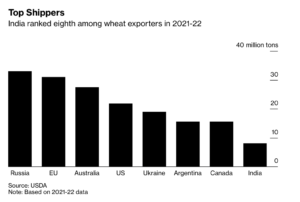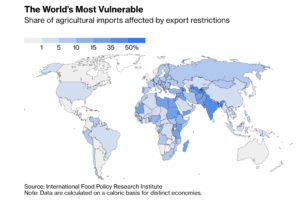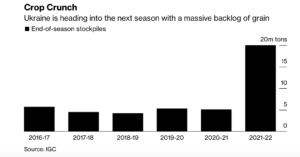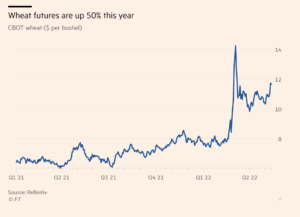A prolonged military conflict in the Middle East could potentially upend key commodity markets due to Iran’s control of the Strait of Hormuz, one of the world’s most important trade…
Global Food Problems “Piling Up,” India Wheat Export Ban Adds to “Global Strains”
Bloomberg writer Pratik Parija reported today that, “India’s move to restrict wheat exports is set to reverberate through global agricultural markets, exposing just how tight global supplies are after the war in Ukraine and threatening to drive up food prices even more.
“The government said in a notification dated May 13 it will suspend overseas sales to manage its food security. This drew criticism from the agriculture ministers of the Group of Seven nations, who said that such measures make the world’s crisis worse.
“The surprising thing is that India isn’t even a prominent exporter on the world stage. The fact that it could have such a major impact underscores the bleak prospect for global wheat supplies. War has crippled Ukraine’s exports, and now droughts, floods and heat waves threaten crops in most major producers.”

Gerry Shih and Niha Masih reported in today’s Washington Post that, “The [India wheat export ban] announcement was an abrupt reversal weeks after Indian officials and international analysts talked up the possibility of India’s significantly ratcheting up exports to fill the gap created partly by the war in Ukraine.”
New York Times writers Sameer Yasir and Victoria Kim reported yesterday that, “The export ban could be a further blow to international organizations working to counter the increasing threat of widespread hunger. The World Food Program, a United Nations agency, has warned that an additional 47 million people could go hungry as the war’s ripple effects add to an existing crisis of steep increases in food prices and a fertilizer shortage.”
Also yesterday, Wall Street Journal writers Alistair MacDonald, Nicholas Bariyo and Philip Wen reported that, “Soaring food prices are triggering shortages and protests across the developing world as disruption from the Ukraine war adds to existing strains on global supplies of grains, meat and other foodstuffs.
“India on Saturday invoked a rare ban on wheat exports to help tame domestic prices, a move likely to exacerbate global strains. The country is the world’s second-largest wheat grower, behind China. Late last month, Indonesia halted the export of certain types of palm oil in an effort to lower soaring prices of cooking oil at home.
“Rising prices helped stoke the violent unrest that led to the resignation of Sri Lanka’s prime minister earlier this week and have fanned more peaceful protests in the Middle East. In parts of Africa, millers have run out of wheat. Consumers are skimping on food items once considered everyday staples and substituting cheaper products.”
The 2007-08 global food crisis, triggered by drought & high oil prices, was made worse when some countries banned food exports and others boosted imports in panic because it caused prices to surge even more. Result: an additional 40 million people lost access to food in 2008.
— Maximo Torero (@MaximoTorero) May 14, 2022
A Bloomberg editorial item from Friday stated that, “Governments are compounding the [food market] problem with protectionism. Since the invasion of Ukraine, at least 20 countries have imposed restrictions on food exports, covering around 17% of calories traded globally, including Indonesia’s decision to block crucial palm-oil shipments. Such restrictions risk setting off a cascade effect and driving up prices for everyone: They’re estimated to have accounted for a 13% rise in global food prices during the 2008-11 food crisis.”

Meanwhile, Financial Times writer Guy Chazan reported yesterday that, “German foreign minister Annalena Baerbock said the G7 group of industrialised nations was urgently seeking alternative routes for the export of Ukrainian grain as Russia’s war against its western neighbour raised the risk of a global ‘hunger crisis.’

“Speaking at the conclusion of a three-day meeting of G7 foreign ministers in Germany, Baerbock said some 25mn tonnes of grain were stuck in Ukrainian ports that were being blockaded by Russian forces — ‘grain that the world urgently needs.'”

The FT article explained that, “[Baerbock] said some 5-6mn tonnes of grain per month are normally exported via Ukraine’s ports and the G7 was ‘analysing different rail routes that will allow us to get the grain out as soon as possible.’
“So far, she said, the Ukrainians had succeeded in transporting only a ‘fraction’ of their grain harvest by rail, via Romania. ‘But the bottleneck there is due to the fact that Ukraine has a different track gauge [to Romania],’ she said. ‘That’s the same for other connections too, for example, with Poland — freight cars can’t just pass through.’
“She said the G7 ministers had also discussed using Baltic ports to export grain. ‘But you have to reach them first.’ ‘There won’t be a perfect solution so long as the [Russian] bombardments are continuing,’ she said.”
Claire Parker reported in today’s Washington Post that, “On an average working day, some 3,000 train carloads of grain arrive at Ukrainian ports, where they are stored in silos and, in peacetime, shipped across the Black Sea and through the Bosporus and then around the world, [David Beasley, head of the United Nations World Food Program] said. With exports blocked, the silos are full — meaning there is no place to store grain from the next harvest, due to take place in July and August.”
And Reuters writer Pavel Polityuk reported late last week that, “Ukraine can export no more than 1.5 million tonnes of agricultural products a month because of a Russian blockade of its ports, First Deputy Agriculture Minister Taras Vysotskiy said on Friday.
“He was quoted by Interfax Ukraine news agency as saying that before the blockade Ukraine could export more than 5 million tonnes of agricultural crops each month. Ukraine is now sending its products abroad by rail.”
In other developments, Reuters News reported late last week that, “Soaring bread prices have triggered protests in Iran in which some shops were set on fire, prompting police to arrest scores of ‘provocateurs,’ the official IRNA news agency said on Friday.
“The protests were triggered by a cut in government subsidies for imported wheat that caused price hikes as high as 300 percent for a variety of flour-based staples.”





